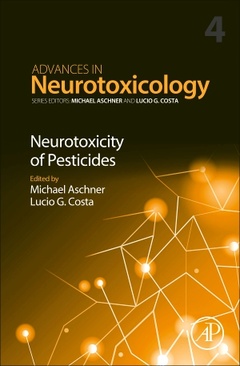Description
Neurotoxicity of Pesticides
Advances in Neurotoxicology Series
Directors of collection: Aschner Michael, Costa Lucio G.
Language: English
Subject for Neurotoxicity of Pesticides:
288 p. · 15x22.8 cm · Paperback
Description
/li>Contents
/li>Readership
/li>Biography
/li>Comment
/li>
Neurotoxicity of Pesticides, Volume Four, in this comprehensive serial addresses contemporary advances in neurotoxicology of pesticides by providing authoritative review articles on key issues in the field. Edited by leading subject experts, topics of note in this new release include Organophosphates, OPs, Nerve agents, Pyrethroids, Neonicotinoids and Formamidines, among others.
1. Neuropathy target esterase (NTE/PNPLA6) and organophosphorus compound-induced delayed neurotoxicity (OPIDN) Rudy J. Richardson, John K. Fink, Paul Glynn, Robert B. Hufnagel, Galina F. Makhaeva and Sanjeeva J. Wijeyesakere 2. Neurotoxicity of organophosphate nerve agents Ramesh C. Gupta 3. Neurotoxicology of pyrethroid insecticides David M. Soderlund 4. Neurotoxicity of Neonicotinoids Arturo Anadón, Irma Ares, Marta Martínez, María Rosa Martínez-Larrañaga and María Aránzazu Martínez 5. Rotenone neurotoxicity: Relevance to Parkinson's disease Vivek Lawana and Jason R Cannon 6. Neurotoxicity of amitraz, a formamidine pesticide Lucio G. Costa
Dr. Lucio G. Costa is Professor of Toxicology at the University of Washington in Seattle, and of Pharmacology/Toxicology at the University of Parma Medical School. He received a doctorate in Pharmacology from the University of Milano in 1977, and was a postdoctoral fellow at the University of Texas at Houston. He is a member of several national and international professional organizations, a Fellow of the Academy of Toxicological Sciences, and a European Certified Toxicologist. He received various award for his scientific accomplishments,
- Provides a unique, first of its kind resource
- Contributed to by world leaders in neurotoxicology
- Contains a diversity of topics (from molecular to epidemiology) in neurotoxicology




